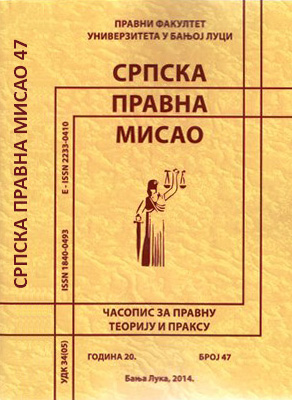THE PRESIDENCY OF BOSNIA AND HERZEGOVINA IN THE FUNCTION OF INTERNATIONAL REPRESENTATION AND MAINTENANCE OF INTERNATIONAL RELATIONS
DOI:
https://doi.org/10.7251/SPM1447143CAbstract
For today's states, as the most important subjects of international relations, it is characteristic that, in most cases, the head of state is the most important body that deals with representing and representing the state to the outside world, maintaining international relations, that is, deciding in the field of foreign policy. It is common for the internal regulations of modern states to determine that the head of state is a foreign body (one person), however, there are exceptions to this rule in states whose constitutional norms establish a collective body at the head of the state - the collective head of state. The Presidency of Bosnia and Herzegovina, as the collective head of this extremely complex country, also performs one of the most important state roles, which is the management of the foreign policy of Bosnia and Herzegovina. There is a frequent and visible phenomenon of the lack of necessary consensus and the appearance of uncoordinated individual statements by the members of the BiH Presidency, which violate the concept of the unique performance of this collegial body in the international representation and maintenance of international relations, and which at the same time damages the international reputation of Bosnia and Herzegovina and additionally burdens its internal relations. . As the principle of consensus and equality of the three constituent nations is the basic prerequisite for the BiH Presidency to fulfill its constitutional role, the lack of consensus realistically leads to the possibility that the work of the collective head of Bosnia and Herzegovina will come to a dead end in matters of representation and maintenance of international relations. Given that the condition for building a stable and peaceful Bosnia and Herzegovina is mutual respect, tolerance, cooperation, solidarity, building the capacity for consensus decision-making and collective action, such mechanisms are also necessary for the operation and future of the BiH Presidency in conducting foreign policy.
Downloads
Published
Issue
Section
License

This work is licensed under a Creative Commons Attribution-NonCommercial-NoDerivatives 4.0 International License.



